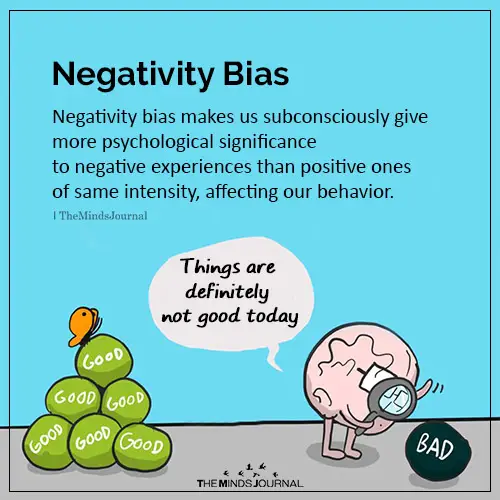“While the negativity bias is good for survival in harsh conditions, it’s lousy for quality of life, fulfilling relationships, personal growth, and long-term health. It makes us over-learn from bad experiences and under-learn from good ones.” – Rick Hanson
How To Turn Your Negative Bias Upside Down
Do you find yourself worrying or thinking more often about the things that are wrong in your life rather than the things that are good? Or maybe your partner made the bed and took out the garbage for you today but you got hyper-focused on the crumbs left all over the counter?
Turns out you are not just a nag or a negative person, but a victim of the biological phenomenon known as negativity bias. Despite this hardwired feature in our brains, you can learn how to overcome the negativity bias with some strategies to help retrain your brain.
Finding more balance between the negative and positive in your life will not just benefit how you feel but will create more happiness and satisfaction in your work, relationships, and attitude about life.
Related: 10 Ways To Stop Being Pessimistic
What Is The Negativity Bias
The negativity bias is the idea that when two situations of equal significance are experienced or witnessed, the negative situation or comment, will have a much greater significance and stand out in your memory than the positive experience. Psychologist Rick Hanson states that “The mind is like Velcro for negative experiences and Teflon for positive ones.”.
It’s why we might have a tendency to overthink those negative experiences throughout our days and in part, why the news and media consistently report far more about the problems in our world rather than the positive. Research on negativity bias has found that people are far more likely to respond to negative stimuli than positive, something the media and advertisers are very well aware of and use consistently to motivate the public to buy, watch or consume their products.
It explains the rationale for our tendency to work harder to avoid something rather than to obtain something. I spoke about this “function of behavior” in my article on creating positive habits. The majority of what we do is built around the idea that we will work much much harder to avoid something being taken away. Reinforcement (discipline) systems in our schools are set up around this idea as well as much of our social system, (think about your tendency to speed when there is no police in sight).
Case in point, your retirement accounts are up thousands of dollars, and then suddenly you notice it drops, but overall you are still ahead. It’s definitely an “ouch” moment regardless of your experience and knowledge in finance, and for some, despite the fact that you are ahead overall, it might prompt some panic which turns into a call to your financial advisor to make a few changes in your investments.
In this example, we move into defense mode and try to fend off any danger, which is the evolutionary explanation for the negativity bias. It protects us from danger. Historically, if you are sensitive to the sting and pain of a negative situation, you are in a better position to protect yourself which ensured your chances of survival.
In a similar way, they found that students learn better when teachers had the threat of money being taken away rather than earning extra when they did well. Or why we are more apt to make a complaint when service is bad, rather than when it is good.
Below is a quick video that explains how our brains are wired for negativity with other examples of how this plays out.
It’s A Matter Of Nature, Not Nurture
We all have our own unique personalities which of course has something to do with the way we interpret information and of course, there are our own unique experiences that create a baseline of what to expect in similar situations. However, we know that even from infancy, we are more receptive and more likely to respond to negative attention than we are to positive attention.
This is why for every negative comment or experience it takes 5 positive comments or experiences to correct the lasting negative information you received. This is particularly important when it comes to correcting children in school and at home. The research finds that students need negative feedback or constructive criticism to motivate change, however, this needs to be mixed in with the positive affirmative messages as well.
When it comes to schools, it is also super important to think about the home environment a student might be coming from as well. If we know that home is not supportive, you might find better results from the positive reinforcement rather than the negative, not to mention what this will mean to that student.
Related: If Happiness Is A Choice Why Are So Many People Miserable?
Emotional Reactions Create More Pronounced Memories
I have had a running joke with a few friends and family members who have a notably “bad memory”, and when they do remember situations or experiences it is because it is tied to a strong emotional reaction. Have you noticed this in your own life?
It is why throughout history we know exactly where we were and what we were doing when big news hit, such as 9/11 or the Challenger explosion, or when JFK was assassinated. Some of these events were scary and traumatic.
A traumatic incident is an intensely negative situation that threatens a person’s well-being, physically or emotionally. Part of the physical reaction to a traumatic incident is for cortisol and other stress hormones to be released into the bloodstream, which helps you survive the situation. Typically these stress hormones hinder memory however, there is also an argument that these experiences (and the hormones in our body) can cement something into our brains as well.

Undoing The Negative – Rewiring Your Brain
In the past, this inclination to be more sensitive to negative information, our negativity bias, protected us and kept us safe, but the world we live in today is far safer than it was even just 100 years ago. What kept us safe then, is not necessarily what will keep us safe now, in fact, negativity puts us at risk for anxiety, depression as well as a lack of happiness and fulfillment in our lives.
But evolution is slow and this is just another manifestation of the way modern progress is working against nature and keeping us from experiencing the many positive and beneficial aspects we have available to us in the modern world.
Being too focused on the negative today is far more likely to detract from our overall happiness than contribute to our well-being.
The root of many mental health challenges is the way in which we think about the information we are exposed to and the experiences we have in our daily lives. Therefore it is also important to take an active role in flipping the script when it comes to how we see and interpret negative information in our lives, which I would argue will increase anxiety and depression in the long run.
We need to learn to incorporate the good with the bad around us and work harder on remembering the positive.
Related: How To Rewire Your Brain To Get Rid Of Negative Thoughts, Research Reveals
5 Strategies To Rewire Your Brain
You can turn your negative thinking upside down with these simple strategies.
1. Recognize Your Patterns.
Hopefully, after reading this article you will be a lot more in tune with how the negativity bias plays out in your life and in your family. Noticing this pattern will in and of itself create opportunities to shift your thinking.
2. Counter the Negative with 2-3 Positives.
This is a strategy that you can implement for yourself or even at home with your kids and/or significant other. Create a rule that for every comment that is made which is negative, make it a point to throw in 2-3 positive statements or experiences about the day or the situation. Granted this is less than the recommended 5, but it will be a start to retrain your brain to look for the positive before looking for the negative.
3. Self Care.
Maintaining a positive outlook is like any other part of our self-care routines. If we are taking care of the different parts of ourselves we will be more resistant to the challenges and negativities that we encounter in our daily life. Make healthy choices and your thought process will follow.
4. Catch the Negative Self Talk.
We all have an inner dialogue which is probably our harshest critic. Once we hear something negative this can unleash a barrage of negative memories and faux pas that we have committed over the years, and this is a major culprit in the fight against negativity.
If you notice that your inner dialogue is skewing more negatively, check yourself and look for the things you can feel grateful about. It won’t be an automatic shift but it will create some space for the positive thinking to infiltrate the negative and at the very least open up the possibility for balance between the negative and the positive.
5. Watch Less News.
We know that the news tends to be mostly negative, this doesn’t help us maintain a healthy balanced perspective on what is happening in the world.
Choose your news sources mindfully and make sure that you only listen or watch here and there. Reading the news will give you more control over what you are exposed to and you will be able to skim through the more sensationalized bytes.
In Summary
We are all prone to pay closer attention to the negative information we get in a day but we can rewire our brains with intentional practices. Rewiring our brain will train our thought patterns and allow room for the positive alongside the negative which will, in turn, help us to feel happier and more positive about our lives. Rewiring our brains is like learning anything or breaking any bad habit, it will take repetition and mindfulness to counteract the natural tendencies and the way in which information is shared with us.
So, the next time someone tells you that you are a “glass is half empty” person or calls you a “Negative Nelly” try not to take it to heart, you can simply remind them that you, like they, are products of thousands of years of evolution and you’re working on it.
Related: 15 Common Cognitive Distortions That Twist Your Thinking
If you found this article helpful, please share it with your friends and family. Maybe this will open up an opportunity to create some awareness in your social network and we can slowly, as a society, create the shift from a negative way in which we share information to a more positive hopeful pattern. They too can begin to understand that this is just how our brains work, in the same way, our lungs breathe and our hearts beat, but the power lies within us to make that change.
Check out my YouTube video! Bringing life to my blog posts… check it out! I promise they will get better.
Join the Upside Down Flan Community, a professional mental health forum where you will learn how you can turn YOUR life right side up, sign up here for my weekly newsletter where you will have access to all of my free mental health tools and easy tips!
Written By Meredith Flanagan Originally Appeared On Upside Down Flan









Leave a Reply
You must be logged in to post a comment.